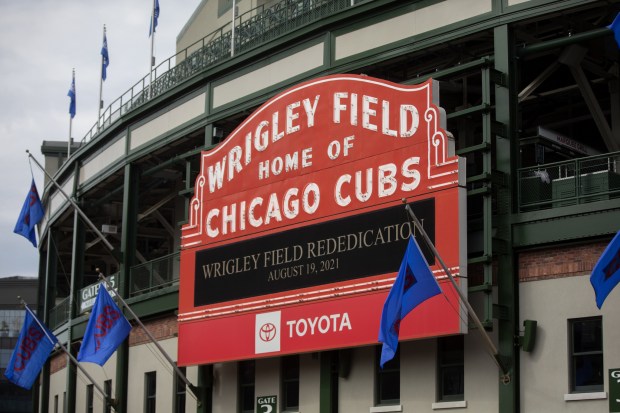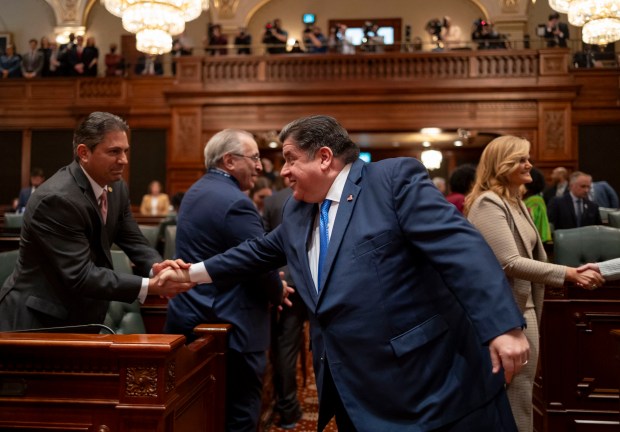As city and state lawmakers discuss public funding for the Chicago White Sox and Bears to build new stadiums, the Chicago Red Stars are making a move to be part of the conversation.
The National Women’s Soccer League club’s current stadium in suburban Bridgeview is not ideal for the team, and it has been a pressing issue predating the new ownership group. If elected officials use taxpayer dollars for new stadiums for the White Sox or Bears, then Red Stars executives contend they also should be included in whatever funding is allocated.
Red Stars Executive Chairperson Laura Ricketts and team President Karen Leetzow recently met with Illinois House Speaker Emanuel “Chris” Welch in Westchester and are scheduled to meet this week with Illinois Senate President Don Harmon at his district office in Oak Park.
The Red Stars are in the fact-finding phase of selecting a potential stadium site within the city, sources told the Tribune, and have not determined the level of funding that would be needed. Ideally, the club would find a location in Chicago that fits both a stadium and training facility. Those plans do not include moving in at Guaranteed Rate Field, the current White Sox home, if the Sox head for the exits.
The Chicago Cubs, meanwhile, acknowledge active talks have begun with Mayor Brandon Johnson’s administration about what City Hall can do to help the team secure an MLB All-Star Game as soon as 2027 or 2028. The Cubs’ previous efforts were rejected by other mayors, but Johnson has signaled he’s more amenable to helping.
As the conversations swirl, it remains an open question whether Gov. J.B. Pritzker, state lawmakers or Chicago officials would help fund any major stadium project with public dollars.
“I think I’ve been really clear about the fact that the taxpayers’ dollars are precious and the idea of taking taxpayer dollars and subsidizing the building of a stadium as opposed to, for example, subsidizing the building of a birthing center, just to give the example, does not seem like the stadium ought to have higher priority,” Pritzker told reporters at an unrelated event Monday. “Unless a case is made that the investment yields a long-term return for taxpayers that we can justify in some way, I haven’t seen that yet.”
But Leetzow told the Tribune that if discussions are being had about funding sports stadiums, “equity needs to be part of the conversation.”
“Women’s sports need to have a seat at the table. We need to be in the mix because otherwise we’re just going to end up chasing our tail around how to grow women’s sports,” Leetzow said. “If you’re a politician, what better way for you to leave a lasting legacy in the state of Illinois or the city of Chicago than to do something that’s never been done, which is provide meaningful funding for women.”
Chicago Red Stars President Karen Leetzow. (Megan Bearder/Handout)
The Red Stars’ efforts have the support of the NWSL and Commissioner Jessica Berman. Berman told the Tribune the league’s interest in the situation stems in part from ensuring the NWSL and its clubs are involved when important decisions are made on behalf of communities. The league also wants to provide NWSL owners, and by extension community leaders, with knowledge and understanding of how other league cities are thinking about their clubs’ infrastructure.
Berman noted how men’s sports have historically been viewed as community assets, something women’s sports worked a long time for the industry to recognize similarly. One of the main hurdles facing the Red Stars comes on the educational front, in helping legislators understand the quality of play that needs support and the payoff of investing in women and soccer.
“We feel that we’ve now proven that there’s a business model and that there is a proven value to offer as a community asset,” Berman said, “and with all that in mind, we therefore expect to be thought of and have an opportunity to contribute to any dialogue around investment and infrastructure as it relates to the future of the footprint of any city.
“We really are at this important inflection point because it is true that for the first time women’s sports is actually being valued from the business community, and we know that in order for that to be sustainable, viable, successful in the long term, that infrastructure and both local, state and public-private support is really important to the future of our business.”
A model for success?
Patrick and Brittany Mahomes attend the 2023 ESPY Awards on July 12, 2023, in Hollywood, California. (Frazer Harrison/Getty Images)
The Kansas City Current could provide a potential stadium-building blueprint for the Red Stars. This season the Current will open the seven-acre, $117 million CPKC Stadium, the first built solely for a women’s professional sports team. The team relied on a public-private partnership, receiving $6 million in state tax credits for the stadium, while its $18 million training facility, located 6.5 miles away, was privately funded by its ownership group, which includes Kansas City Chiefs quarterback Patrick Mahomes and his wife, Brittany.
Leetzow believes the private-public partnership can be as important as Title IX. The government’s investment in Title IX and preventing discrimination against individuals on the basis of sex paved the way for women in sports. She argues there are similar gains to be made on the infrastructure front.
“When it’s really meaningful, the conversation does not revolve around equity in a way that would bring women’s sports along with all of the growth in women’s sport. How do we make that resonate?” Leetzow said. “I mean, not only are we lagging behind in the U.S., but we’re lagging behind the world.”
Berman believes the Current’s model could “absolutely” be replicated by other NWSL clubs.
“We know and believe that it’s a proof of concept that’s already being studied in many of our markets, not just by our own investors, but by local politicians and other community influencers who know and see the value of offering a proper home for our team to play where we can actually have control over our own schedule and our own revenue streams,” Berman said.
When real estate firm Related Midwest released artist renderings two weeks ago of the proposed development of The 78 that included a spot for a new White Sox ballpark, it included an image of Guaranteed Rate Field converted into a soccer stadium. The possibility of the ballpark becoming a home for soccer was recently raised to the Chicago Fire, who play at Soldier Field.
The Red Stars, however, have not been contacted by anyone from the White Sox or Related Midwest about the site. And even if they had, the Red Stars are not interested in repurposing a stadium that a Major League Baseball team has deemed unviable, sources told the Tribune.
“Our sport, our investors, our clubs deserve a seat at the table to have a say in controlling their own destiny, and we know how essential that is to set up a long-term sustainable and viable business,” Berman said.
The Red Stars’ lease at SeatGeek Stadium in Bridgeview runs until December 2025.
“We are the Chicago Red Stars,” Leetzow said. “We tie ourselves to Chicago as much as we can. That’s where our fans are coming from, but we need a stadium in the city and that’s our goal.”
Berman believes the city has an opportunity to lead by example for women’s sports.
“It feels to me that this is a sort of seminal moment in the future of Chicago in terms of how they want to look at being the home of professional sports teams,” Berman said. “The Chicago Red Stars are a staple in our league, and we want for them to be set up for success. In order for that to happen, there needs to be a relationship with the community to ensure that they have a long-term sustainable solution to be able to continue to invest and to continue to offer the incredible entertainment and competition that is the NWSL.”
A hurdle at Wrigley
The Wrigley Field marquee announces a rededication event on Aug. 19, 2021. (Erin Hooley / Chicago Tribune)
As Chicago teams invest in stadiums and infrastructure, the Cubs’ attempt to land an All-Star Game, confirmed by Chairman Tom Ricketts on Feb. 19, centers on one long-standing hurdle relating to security at Wrigley Field.
“There’s a few things we have to work out with the city and we’ve gotten snagged, but I think we’re getting close,” Ricketts said. “Hopefully, we’ll know more pretty soon. But it’s not as simple as it looks and a lot of teams want the All-Star games. They are big economic drivers for the city and so they’re not easy to get.”
Although safe, the ballpark security does not meet MLB’s high standard to host the Midsummer Classic. Ricketts would not delve into the specifics of what security upgrades are required of the Cubs. However, several sources told the Tribune the Cubs need to install bollards to control traffic and safety around Wrigley, which would cost about $30 million.
The Cubs tried to get this project off the ground with city support from the previous two mayors, Rahm Emanuel and Lori Lightfoot. Now they’re trying again with Johnson’s office.
The Cubs have not looked into getting the bollards funded at the state level, though that doesn’t mean they wouldn’t at some point pursue that path if their efforts to engage the city continue to drag. The Cubs have not hosted the All-Star Game since 1990; only two teams, the Oakland Athletics and Tampa Bay Rays, have not been awarded the game in that span. The next available years are 2027 and 2028.
“We have talked about security around the ballpark for some time,” said 44th Ward Ald. Bennett Lawson, whose ward includes Wrigley Field. That includes permanent bollards and widening the sidewalks on the Addison Street side. Emanuel in 2017 insisted the team make the investments itself.
“I know the Cubs have always wanted a partner when it comes to the cost and the work. That hasn’t been a secret,” Lawson said, noting the stadium and surrounding neighborhood redevelopment was privately financed. “I certainly would not blame them for bringing it up now.”
A spokesperson for Johnson did not confirm talks with the Cubs or whether the city would spend public dollars to help make the stadium upgrades.
The city “continues to be open to conversations with all of Chicago’s teams to ensure that they can remain viable in Chicago for the long term,” the spokesperson said. “All proposals are evaluated on a case-by-case basis based on the best interests of the residents of Chicago.”
Pushback from Springfield

Major public funding for privately owned sports stadiums has garnered even less enthusiasm from Pritzker and some of his allies in the state legislature’s Democratic supermajority, especially after the governor’s budget proposal unveiled roughly $900 million in tax increases amid other mounting budget pressures.
Already, some Democrats have raised concerns about how more spending on the asylum seeker crisis — the governor proposed an additional $182 million for the budget beginning July 1 — could take money away from U.S. citizens in impoverished communities.
Pritzker on Monday reiterated his lukewarm desire for major state incentives going to a new White Sox stadium, a position similar to the one he has shared about the Bears and their ongoing quest to find a new home away from Soldier Field. While he noted the artist renderings of the proposed new White Sox ballpark’s site “all look terrific,” he said “that’s not enough to make it a priority, in my view, for Springfield.”
Last week, ahead of White Sox Chairman Jerry Reinsdorf’s visit to Springfield to meet with Democratic and Republican legislative leaders, Democratic lawmakers also were critical of the prospect of Reinsdorf wanting more than $1 billion in state and city incentives for the new ballpark at The 78. Reinsdorf and Curt Bailey, the head of Related Midwest, reportedly pitched a combination of funding sources to borrow against for a new stadium: an extension of the state’s hotel tax to pay for new debt, plus a new sales tax overlay district and a portion of tax increment financing revenues funneled to a special city development fund.
State Rep. Kelly Cassidy, a Democrat from Chicago’s Far North Side, expressed on social media her disdain for giving Reinsdorf another infusion of public money.
“Let me see if I have this straight: Billionaire businessman doesn’t like the last stadium we built for him & wants us to pay for a new one,” Cassidy wrote on X, formerly known as Twitter. “Couldn’t even bother with the usual not quite a billion demand and just going full Dr. Evil. Not a penny, pal. #ReadTheRoomJerry”
In 1988, Reinsdorf scored big in Springfield when legislators approved a last-minute deal that led to the construction of what is now Guaranteed Rate Field, where the team’s lease runs through 2029. The stadium was to be paid for by money raised through an increase in taxes levied on hotel room stays in Chicago, while the city and state each would also kick in $5 million per year.
The Illinois Sports Facilities Authority, which owns the property around Guaranteed Rate Field, still owes $50 million on the current stadium, which opened in 1991, and $589 million on the 2002 renovation of Soldier Field.
Those bonds are supposed to be repaid with a 2% hotel tax and the city’s and state’s annual contributions. In years when hotel taxes are not enough — as was the case the last two years — a portion of Chicago’s cut of state income taxes is intercepted and used to pay the debt.
As Reinsdorf and his associates shuttled from one meeting to the next within the statehouse last week, he declined to give specifics when peppered with questions from reporters about what he discussed with legislative leaders.
“I don’t mean to be evasive,” Reinsdorf said as he left one of the meetings. “Everybody’s been very cordial.”
The White Sox were only the latest sports franchise asking Illinois lawmakers for new stadium financial incentives. Democratic lawmakers last year introduced a couple of bills that would grant the public incentives to the Bears in the team’s quest for a new venue. So far, none of that legislation has gone anywhere.
Johnson has seemed slightly more receptive to offering public help for stadiums, telling reporters last week he was “grateful” both the Bears and White Sox expressed a commitment to stay in Chicago.
“As far as financing these projects, both organizations know that they have to put some skin in the game and they’ve expressed a commitment to do that,” he said. “We’re going to explore all options, but we have to make sure that we’re doing right by the people of Chicago.”
Johnson has his own budget pressure. Last week, the ratings agency S&P Global revised the city’s outlook downward — from positive to stable — noting the strain the asylum-seeker response is placing on the city’s budget, alongside rising costs for contracts and pension payments for Chicago police and likely other city unions.



